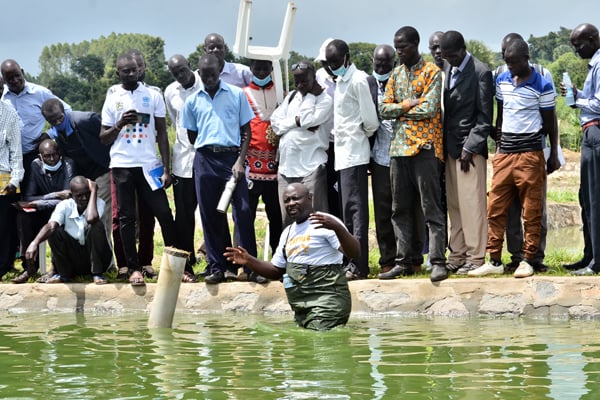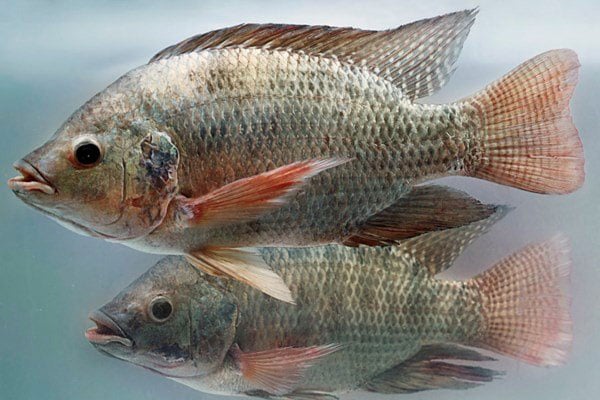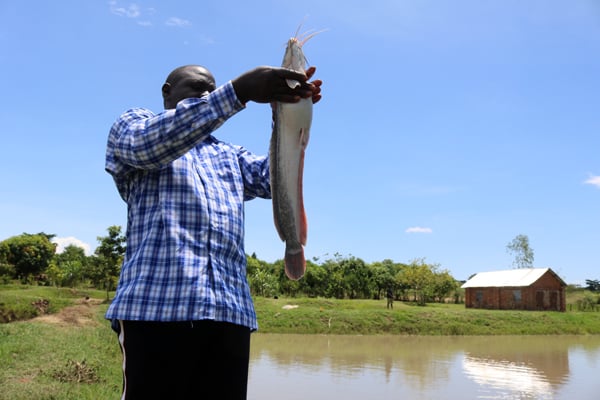Prime
Stress: Barrier to profitable fish farming

Howard Kasigwa explains how a well designed pond can help reduce stress to the fish. Photo/George Katongole
What you need to know:
- Since ponds are an open environment you may find that pollutants enter the water which directly affects water quality and can have an impact on the health of the pond. Experts offer tips on how farmers can avoid making losses due to polluted water.
Fish farmers have to constantly deal with challenges to be able to reap the benefits.
Fish farming in Uganda is still at a nascent stage. Up to 15,000 tonnes of fish are produced annually from aquaculture including production from small-scale farmers, commercial fish farmers and water reservoirs or minor lakes.
According to the National Agricultural Advisory Services (Naads), there are an estimated 20,000 ponds throughout the country with an average surface area of 500m² per fish pond.
Uganda is the second largest aquaculture producer in Sub-Saharan Africa after Nigeria. Aquaculture production in Uganda increased from just over 800 tonnes in 2000 to 103,700 tonnes in 2019.
It is estimated that 153,000 Ugandans were involved in fisheries and aquaculture in 2019, of which 124 800 were engaged in inland waters fishing and 28,236 in fish farming. In 2019, fish and fishery product exports were valued at $160m, with the bulk destined to European countries.
Fish farming is largely a profitable venture but beset by numerous challenges.
Apart from the usual global challenges of lack of quality fish seed, lack of fish feeds, poor extension, and poverty, Uganda has typical challenges including the lack of traditional experience for aquaculture in the region.
Howard Kasigwa, a fish research officer at Ngetta Zardi says small-scale aquaculture is helpful for food security and poverty alleviation.
While handling prospective farmers at the Seeds of Gold Farm Clinic, Kasigwa explained that farmers at every production level need to observe stress as something that can squeeze them out of the market.
“It is necessary to provide fish with optimal living conditions. Because it can strongly impair fish performance, stress is a major risk to consider in aquaculture,” he says.
Water quality
Ponds are by their nature exposed to pollutants unlike the natural environment. The most common sources of pollutants are: heavy rain which is likely to raise the acidity of the water, concrete from new ponds by leaching lime and garden chemicals such as pesticides, among others.
He says that rain often washes the excess chemicals off the crops into nearby ponds, streams or rivers, poisoning some of the animals living there. Powdery chemical fertilisers, containing nitrates, are put on the crops to help their growth but they can also be washed off by rain into nearby ponds. They do not poison the wildlife but the rich supply of nitrogen causes the water plants, especially algae, to grow very quickly. The plants use up so much oxygen during the night and during decaying processes that there is none left for the other pond-life. The growth also prevents sunlight reaching the organisms below. Eventually, all the algae die leaving a smelly, decaying mass.
The most common cause of fish stress is poor water quality often caused by the build-up of fish and plant waste – after all fish live in their own toilet.
Water quality problems are not visible to the naked eye so the only way you can monitor them is with regular use of water test kits.
Kasigwa explains that if a farmer fears their pond has been polluted, it is important to test the water to highlight changes in acidity and treat accordingly.
“Poor water quality can lead to disease outbreaks. Like humans, if a fish becomes stressed it is much more likely to fall ill so fish stress is one of the major causes of disease outbreaks in the pond environment,” he explains.
Kasigwa says that a healthy pond is important to prevent fish stress.
The first step is to ensure that water in the pond remains clean if it is to provide a healthy environment for the organisms (animals and plants) living in it.
He explains that natural waste from the living and dead organisms is ‘recycled’ by special micro-organisms in the pond.
“The pond can take care of its own waste – it is people who cause pollution,” Kasigwa says. He says that farmers need to install and regularly maintain filters on the ponds.
Other stress factors
Other factors that cause stress in a fish pond include temperature changes. Kasigwa says that fluctuating temperatures can negatively affect fish health. Changes in temperature, he says, creates a shock to their systems.
He adds that fish can also be physically stressed through rough handling when netting them or by garden predators such as cats and herons. Excessive vibrations caused by people around the pond also stresses fish.
Acidity above 8.5 or low pH of below 6.5 causes unnecessary stress. He says that regular testing and water quality maintenance is therefore important.
Kasigwa explains that sudden changes in pH of more than 1.0 will severely stress your fish.
Environmental pollutants can affect the pond’s pH including heavy rain and the runoff from concreted areas around the pond.
“Regularly use experts to monitor the levels of pH in the pond to catch fluctuations before they become a significant issue,” he advises.
Another stress factor is low oxygen levels which leaves fish gasping at the water’s surface.
Oxygen levels can be reduced by poor water circulation; high water temperatures; high levels of organic waste; oily food coating the surface and some fish medications.
He says that good pond maintenance should minimise organic waste levels and that one should ensure high levels or aeration and circulation when water temperatures are high.
“Avoid fish stress if at all possible but if you know you cannot avoid a stressful situation, for example when adding new fish to the pond or at times of high temperatures, then you can help your fish to cope better by adding tonic salts.




